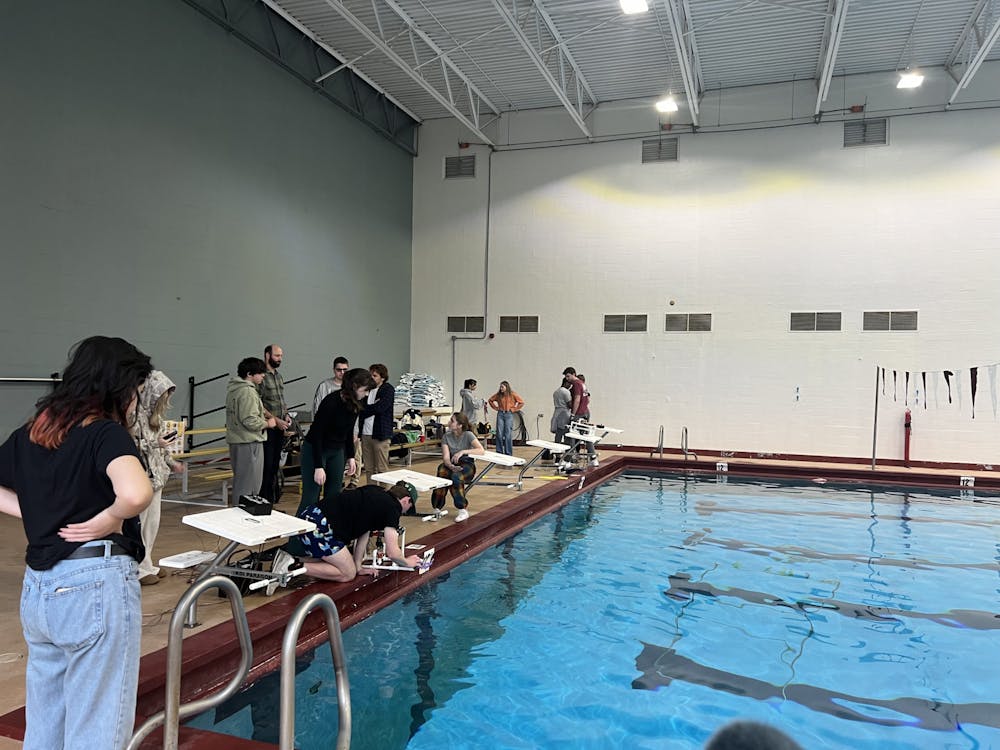Students from five sections of Elon University’s Grand Challenges I engineering course launched underwater remote-operated vehicles as part of their final project.
This course is one of two required for the engineering degree, all of which integrate the National Academy of Engineering’s 14 Grand Challenges in Engineering. This final project exemplifies the 14th: to engineer the tools of scientific discovery.
The course also includes several engineering projects such as an egg drop, and according to its website, incorporates “projects in health informatics, infrastructure design, and engineering for access to clean water.”
Will Pluer, professor of engineering, said the project revolves around using a design-focused approach to the scientific method.
Pluer said the course introduces students to engineering at Elon.
“Engineering is — we often say that if you get it right the first time, you probably weren't solving a hard enough problem,” Pluer said. “What they think are easy tasks, they're learning to do are much more difficult and they have to plan longer and practice a lot.”
Pluer also said this course teaches students to find applicable solutions to real-world problems.
Pluer gave a scenario where students had to add a magnet mimicking a tracker, or tag, a “whale shark” — a PVC structure underwater — on Dec. 1. He said students face challenges that mimic ones in the real world.
“They actually have a list of different challenges that they have to face and then finding out as they roll the dice, what they are going to face to mimic the real world where you don't know all the conditions and can't plan for everything,” Pluer said.
Student groups had to complete several different timed tasks with their ROVs such as “tagging” a shark, taking water samples or determining depth, according to Pluer.
Zoë Scherpbier, a junior mechanical engineering major and teaching assistant for the class, said it helps engineering students learn more about the major.
“I love just listening to how other people think, because I have my own system, like, ‘This is what I envision this to do,’” Scherpbier said. “But I’ve got someone who made a water collection device. That was something I would have never have thought to do. So it's really fun to see the different ideas.”
Scherpbier took the course last year and said she loved it.
“I love building, I love engineering,” Scherpbier said. “It's just a lot of fun. Instead of just looking at a paper and reading, ‘Okay, that's what it kind of does,’ we actually got to do it ourselves. That's very cool.”
Scherpbier also said she has enjoyed being able to learn how other students problem-solve. Pluer said it was intentional to have the students navigate myriad problems.
“They have to deal with trash, removing trash in the area,” Pluer said. “We also have a little RC boat that we've been driving around and buzzing them which disturbs the water looking down into water to see what they're doing and what the currents and makes it really hard to see what their robot is actually doing.”
Sophomore Ella Davis, a mechanical engineering major in the course, finished the challenges with her team in six minutes — the fastest Pluer said he has seen in five years.
Davis said the class has been stressful at times, but has made her grow close with her team. She said this project required a lot of brainstorming to build an efficient robot.
“A lot of it was coming up with the shape: if we add this here, what will it do to impact this part of it?” Davis said. “Or how can we lessen the weight so it moves faster?”
Davis said the course overall has taught her how to use the engineering process.
“It’s just a big part of learning as we move forward in engineering, like how we come up with ideas and how a project progresses,” Davis said.
She said the course grew more challenging over the semester.
“It's just a great experience for us as we move up in engineering as our projects get more advanced,” Davis said. “We started really simply with the egg drop t and now we're moving robots underwater that we build. So I think it's just a really interesting experience to see how things progress and how things can change so much.”
Pluer said results varied throughout the launch day, but all of his students enjoyed it.
“We've had one group that had two or three motors fall apart in the water and the lifeguard had to dive in to get pieces, so both ends of the spectrum,” Pluer said. “But I think everybody's had a lot of fun doing it.”
Davis said the course taught her skills she will continue to use.
“I'm not a big person that likes to ask for help and I had to learn how to ask for help. Also, moving things for the team, so how to spread out assignments for the teams is a big thing that we've learned,” Davis said. “And project management: how to write up a report or summary about an engineering project. So it was really useful going forward.”


